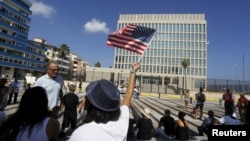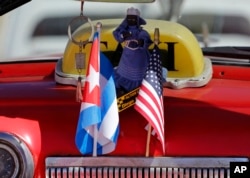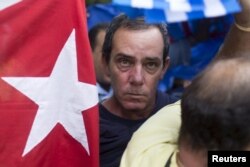President Barack Obama’s scheduled visit to Cuba next month, the first by a sitting president in almost 90 years, could be a key step forward in improving the communist nation’s troubled human rights record.
In a Twitter message Thursday, Obama wrote, “We still have differences with the Cuban government that I will raise directly. America will always stand for human rights around the world.”
The White House said bipartisan support for the president’s Cuba policy was growing, but news of the visit drew criticism from the head of the House Foreign Affairs Committee.
“The Obama administration’s one-sided concessions have only shored up a communist regime that brutalizes its people,” Representative Ed Royce, a California Republican, wrote in a statement. “When President Obama lands in Havana, how will he stand up for human rights?”
Some advances
The Cuban government recently released some political prisoners and has taken small steps to open up Internet access. But a 2015 Human Rights Watch report found the Cuban government “continues to rely on arbitrary detention to harass and intimidate individuals who exercise their fundamental rights.”
The report found detentions actually increased after the diplomatic thaw, with arrests increasing from 2,900 to 7,188 in the first full year after the administration announced the resumption of relations.
Human rights groups welcomed the news of the president’s visit as an opportunity, while cautioning that there was still much progress to be made.
The president’s visit could “signal a pathway for other human rights organizations and entities like the United Nations and the Inter-American [Commission on Human Rights] to be able to have a dialogue and visit the country,” said Marselha Gonçalves Margerin, advocacy director for the Americas at Amnesty International.
Margerin said the thawing in relations should be an opportunity for the Cuban government to look at its internal laws on censorship, Internet freedom and right to assembly, now that the United States is no longer a threat to its sovereignty.
Doubt among Cubans
Cuban citizens expressed doubt there would be meaningful changes after the president’s visit.
“The heads of state must do everything possible in those encounters to work towards the needs of the people, and the Cuban people are in much need for human rights to be respected,” said Eduardo Cardet, coordinator for the Christian Liberation Movement in Holguin, Cuba.
“The rapprochement process has been one-sided,” said Dagoberto Valdés, the director of Convivencia, an independent Cuban magazine. Valdés said he would tell Obama that “he’s made concessions to the Cuban government without asking anything in return, without accomplishing anything in return. The repression has increased.”
Economic relations between the two countries improved last week with the signing of an agreement that would allow U.S. commercial airlines to significantly increase the number of flights to Cuba and the granting of permission for a U.S. company to build a tractor factory on the island.
Sessions with Castro, dissidents
The White House said Obama plans to meet with President Raul Castro and with Cuban dissidents during his visit to the country.
“Unless human rights is really at the focal point of the visit, a trip of this kind by a sitting U.S. president can't help but have a negative impact on the human rights situation in Cuba,” said Marion Smith, executive director at the Victims of Communism Memorial Foundation, a nonprofit that educates the public on the legacy of communism.
Smith said the president’s meetings with dissidents would send a very clear signal to Cuba and the rest of the world that the opening of economic relations is not the only issue of importance for the United States.
“Even though we are opening up economic relations, and as of yet we got nothing for it from the Castro regime, we are still committed as we have been for many decades to a more democratic Cuba where the rule of law and human rights is respected," Smith said.






